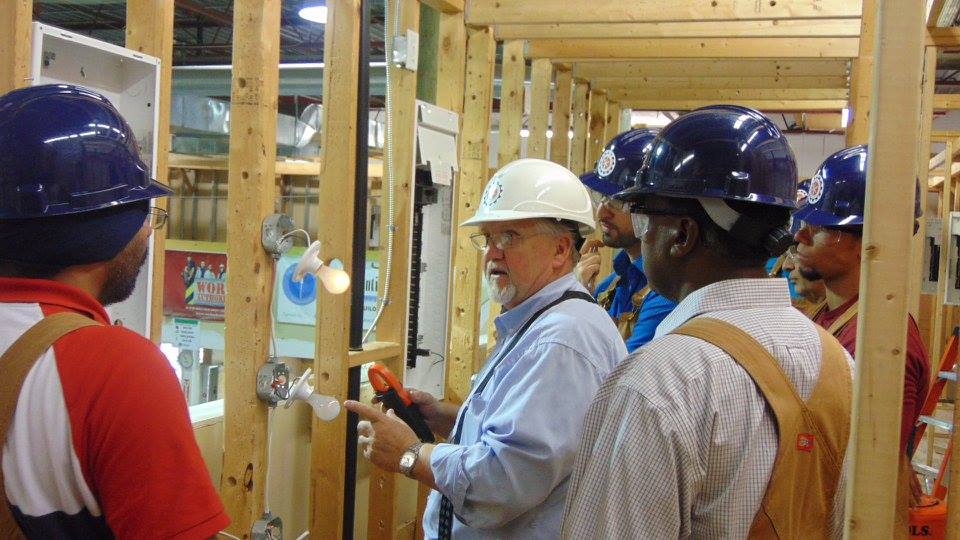Class in session at Herzing College Skilled Trades in Toronto
Updated December 2025
Have you been thinking about learning a skilled trade? Maybe have your eye on electrician, plumber, HVAC or gas tech training?
We've all heard that tradespeople are in high demand across Canada—but that alone shouldn't send you running to enrol in a pre-apprenticeship program.
Building a successful trades career takes quality training combined with several other characteristics and abilities. Are you truly suited to this path? Is trades training actually your best next step?
Ask yourself these six questions to find out.
1. Do you prefer hands-on learning over quiet study?
Trades training is all about learning by doing. Students learn directly from a master tradesperson by practising the techniques they see the master using and working together to solve real-world problems.
But it's important to know: You will spend some time studying theory that is relevant to your trade—like the electrical code, how to interpret building plans and schematics, and the material required to pass certification exams.
But for the most part, you'll be building skills by getting your hands dirty. This type of training is completely different from the quiet study and seated work you would do, for example, in an accounting or business program.
If you're drawn to active, physical work, and prefer hands-on learning, trades training would definitely be a good option for you.
Related: What is a Pre-apprenticeship?
2. Are you a natural problem-solver?
What exactly do we mean by "natural problem-solver?
Let's break it down clearly: we mean you're good at thinking through a challenge or problem methodically (step by step), and figuring out the best way to tackle it. This skill requires calm and patience, the ability to learn from mistakes, and keep pushing toward a solution despite setbacks.
Not everyone has this skill. Some people lose patience very quickly when faced with a puzzle—like putting together IKEA furniture, or sorting out why the faucet keeps dripping.
People who do well in trades training actually enjoy figuring out how things work and how parts go together. They're naturally good at solving mechanical problems and they can think through solutions logically.
3. Are you good with people, friendly, and outgoing?
When they're just starting out, many students underestimate the importance of communication in the skilled trades. But think about it: whether you become an electrician, plumber, or HVAC technician, a huge part of your job depends on clear, approachable, professional communication.
On a regular basis, you'll be expected to:
- clearly explain mechanical issues and solutions to clients
(break it down politely and patiently so they can understand what you're doing)
- make a great impression on homeowners while on service calls
- potentially sell new products and upgrades
- build positive relationships with team members and supervisors
- represent your employer well while out in the field
Your success in pre-apprenticeship training, and throughout your career, will have a lot to do with how well you present yourself and the connections your forge with clients and colleagues. Some trades careers will require more "people skills" than others—but there's no denying that getting along with others is extremely important for this kind of work.
4. Are you willing to keep on learning, even after trades training?
It's surprising to some students just how fast new technology is impacting the trades. Over the last few years, for example, we've seen incredible advances in HVAC and sustainable construction methods, which really are rocking the industry.
Plumbing tools, fixtures, and techniques are also rapidly evolving. Building codes are always changing. Safety standards are improving and becoming more rigorous across the trades.
No matter which field you're in, there will always be new devices to learn about and use, and new ways to upgrade your abilities (and earning potential). The most successful tradespeople are those who keep right on learning, long after their initial training and apprenticeship is complete.
If you're naturally curious, and willing to explore new trends and technologies, you'll do well in the skilled trades.
5. How flexible are you about working nights & weekends?
Now we're getting into the professional, post-training side of things. It's important to look ahead and make sure you're prepared for life on the job after trades training (otherwise it doesn't make sense to start down this path).
It's quite common for tradespeople to work on call and during weekends and nights. You won't always be able to plan out your schedule weeks (or even days) ahead of time. Plumbers, electricians, gas and HVAC technicians must be ready to respond to emergencies, and adapt to whatever the day brings.
Imagine if your A/C stops running, your pipes burst, or your toilet backs up. You wouldn't be satisfied with an appointment two days from now—you'd want a technician at your door ASAP.
6. Are you thinking about owning your own business one day?
No one says you must be an entrepreneur to pursue trades training, but if you are thinking about starting your own business one day, this would be the ideal path to achieving that goal.
After completing an apprenticeship, earning your certifications, and getting some field experience, you could definitely consider setting up your own contracting, electrical, HVAC, appliance repair, or plumbing business.
Ready to Explore Trades Training?
Did you answer yes to most—or all—of these questions? Then you may want to move forward and learn more about your trades training options.
Herzing College offers a variety of trades programs. An admissions advisor can guide you through the available options and help you find the training that fits your needs.
Chat live with an advisor now. Or request more information about a trades program you're interested in. We're here to help!






